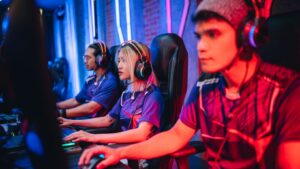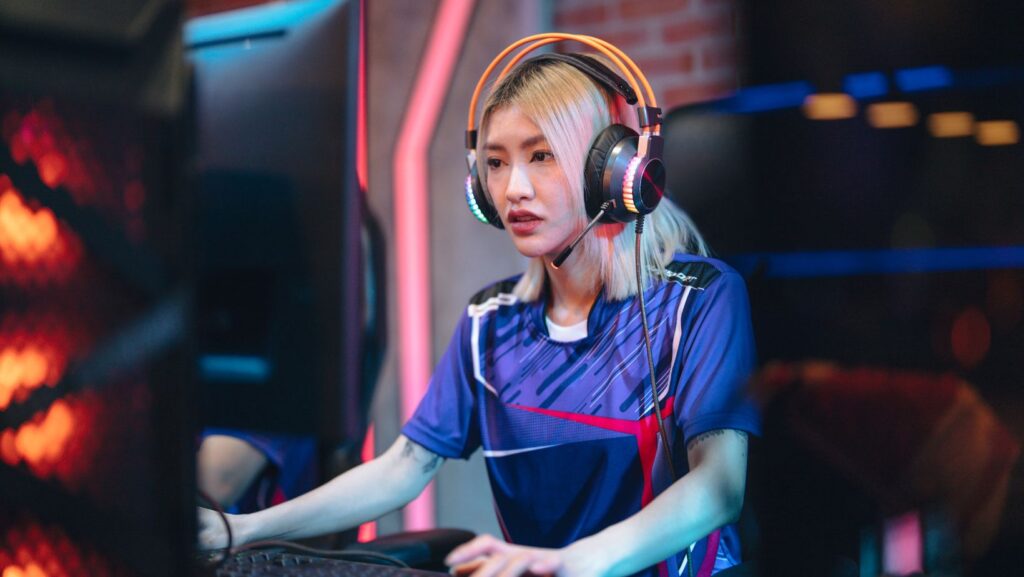Dive into the world of gaming, where pixels and code blend to create alternate realities. But as we traverse these digital landscapes, what’s the impact on our real-world selves? This article explores the intriguing effects of gaming, a phenomenon that’s more than just a pastime for many.
From the adrenaline rush of a hard-fought victory to the cognitive benefits of puzzle-solving, gaming’s effects are far-reaching. However, it’s not all power-ups and high scores. There’s a darker side to consider, including addiction and social isolation. Join us as we delve into the captivating realm of gaming effects.
Gaming Effects
Segmenting into the realm of gaming effects, we delve deeper into this unique phenomenon’s specifics. As we journey from abstract to concrete, let’s unravel the concept of gaming effects under two core areas.
Defining Gaming Effects
 Gaming effects, in essence, comprehend the tangible and intangible reactions evoked by video games in players. These effects traverse a broad spectrum, including physiological responses, like heightened heart-rate during intense gameplay, to psychological effects, such as improved problem-solving abilities. For instance, games like ‘Tetris’ enhance spatial reasoning, while fast-paced games like ‘Call of Duty’ may stimulate quicker reflexes. However, they might also confer detrimental effects, including gaming addiction or aggression. Therefore, gaming effects represent a balanced interplay of beneficial and adverse outcomes.
Gaming effects, in essence, comprehend the tangible and intangible reactions evoked by video games in players. These effects traverse a broad spectrum, including physiological responses, like heightened heart-rate during intense gameplay, to psychological effects, such as improved problem-solving abilities. For instance, games like ‘Tetris’ enhance spatial reasoning, while fast-paced games like ‘Call of Duty’ may stimulate quicker reflexes. However, they might also confer detrimental effects, including gaming addiction or aggression. Therefore, gaming effects represent a balanced interplay of beneficial and adverse outcomes.
Brief History of Gaming
Tracing the lineage of gaming, the progression of gaming effects has been palpable. Video gaming can trace its roots back to the 1950s—with games like ‘Tennis for Two’—where they were merely a novelty with minimal effects. The boom of arcade culture in the 1980s, with the advent of games like ‘Pac-Man’, enhanced the social dimension of gaming, an effect previously non-existent. The ’90s brought about the issue of violence in games like ‘Doom’, sparking debates on how gaming impacts behavior. Fast forward to the 21st century, we witness stimulation of virtual reality games like ‘Beat Saber’, intensifying the immersive experience, and hence impacts, of gaming.
The Psychological Impacts of Gaming
Diving deeper into the psychological dimension of gaming effects, the influence games exert on mental health and the potential for positive psychosocial outcomes deserve attention.
The Connection Between Gaming and Mental Health
 Video games, as a popular form of media entertainment, hold a dual potential for mental health. They can be both the instigator and the reliever of psychological challenges. On one hand, excessive gaming can trigger issues such as addiction and aggression. Reference to the designation of “gaming disorder” by the World Health Organization (WHO) in 2018 validates this perspective. On the other hand, gaming acts as a coping mechanism for many, offering escape, relaxation, or even a platform for social connection, thereby mitigating feelings of stress, anxiety, and loneliness.
Video games, as a popular form of media entertainment, hold a dual potential for mental health. They can be both the instigator and the reliever of psychological challenges. On one hand, excessive gaming can trigger issues such as addiction and aggression. Reference to the designation of “gaming disorder” by the World Health Organization (WHO) in 2018 validates this perspective. On the other hand, gaming acts as a coping mechanism for many, offering escape, relaxation, or even a platform for social connection, thereby mitigating feelings of stress, anxiety, and loneliness.
Positive Psychosocial Effects of Gaming
While acknowledging possible adverse effects, it’s crucial not to overlook the positive psychological impacts that gaming can foster. Skills such as problem-solving and strategizing are harnessed through gameplay engagement. Instances of games like ‘Portal 2’ reinforce cognitive skills. Moreover, games like ‘World of Warcraft’ or ‘Among Us’ serve as platforms for building teamwork, communication skills, and developing social connections.
Game On: The Positive Side of Gaming
 The world of gaming is complex, offering both challenges and rewards. While it’s true that gaming can potentially lead to addiction and social isolation, it’s equally important to recognize its cognitive and psychological benefits. Games like ‘Tetris’ and ‘Call of Duty’ can enhance spatial reasoning and reflexes, respectively. The immersive experience of virtual reality games like ‘Beat Saber’ takes gaming effects to a new level, further intensifying the gaming experience.
The world of gaming is complex, offering both challenges and rewards. While it’s true that gaming can potentially lead to addiction and social isolation, it’s equally important to recognize its cognitive and psychological benefits. Games like ‘Tetris’ and ‘Call of Duty’ can enhance spatial reasoning and reflexes, respectively. The immersive experience of virtual reality games like ‘Beat Saber’ takes gaming effects to a new level, further intensifying the gaming experience.
The psychological impacts of gaming are two-fold. On one hand, it’s been recognized as a disorder by the World Health Organization. On the other, it’s a powerful tool for relaxation, escape, and social connection. Games like ‘Portal 2’ and ‘World of Warcraft’ can foster problem-solving, strategizing, teamwork, and communication skills. The emotional exploration offered by games like ‘That Dragon, Cancer’ highlights the potential of gaming as a medium for empathy and emotional growth. The gaming world is full of potential – it’s all about how you play the game.

